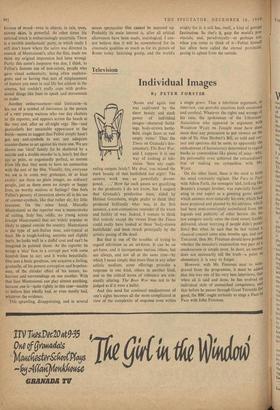Television
Individual Images
By PETER FORSTER 'AGAIN and again one was captivated by the sheer beauty and stark power of individual images—shattered build- ings, body-strewn battle- field, single faces or vast empty vistas.' Thus the Times on Granada's doc- umentary, The Boer War, and I suppose it is one way of looking at tele- vision. 'Seen any capti- vating corpses lately? My dear, you missed the stark beauty of that battlefield last night! The camera work was so powerfully decom- posed. . . .' How far such pxans arc gratifying to the producers I do not know, but I suspect that Granada's production team, aided by Helmut Gernsheim, might prefer to think they produced brilliantly what was, in the first instance, a non-contentious reminder of the waste and futility of war. Indeed, I venture to think that nobody except the viewer from the Times could really have looked at those 'body-strewn battlefields' and been struck principally by the artistic posing of the dead.
But that is one of the troubles of trying to regard television as an art-form. It can be an art-form, and it incorporates various others, but not always, and not all at the same time—by which I mean simply that more than in any other artistic medium, some offerings provoke a response in one kind, others in another kind, and so the critical terms of reference are con- stantly altering. The Boer War was not to be judged as if it were a ballet.
And this need for continual readjustment of one's sights becomes all the more complicated in view of the complexity of response even within a single genre. Thus a television argument, or interview, can provoke reactions both emotional and cerebral. Whatever the rights and wrongs of his case, the spokesman of the Librarians Association who appeared in argument with Woodrow Wyatt on Tonight must have done more than any persuasion to put viewers on the side of Sir Alan Herbert's Bill, so cold and cor- rect and specious did he seem, so apparently the embodiment of bureaucracy determined to regard books as commodities like pieces of soap—whY, his personality even achieved the extraordinary feat of making me sympathise with Mr. Wyatt.
On the other hand, there is the need to keeP the mind constantly vigilant. The Face to Face with Adam Faith, the teenagers' idol, looking like Brando's younger brother, was especially fascin- ating in one aspect as a guessing game about which answers were naturally his own, which had been prepared and planted by his advisers, which had been semi-consciously assimilated from the legends and publicity of other heroes. (In the last category surely came the tired retort, freshlY delivered, about worrying if people didn't pester him.) But when he said that he last visited a classical concert some nine months ago, and saw Toscanini, then Mr. Freeman should have probed whether the maestro's resurrection was part of a smokescreen or simple error. In short, an answer does not necessarily tell the truth—a point 50 elementary it is easy to forget.
However, with Mr. Freeman near to with- drawal from the programme, it must be added that this was one of his very best interviews, that when all is said and done, he has evolved an individual style of unmatched competence, and that before he passes through Great Turnstile for good, the BBC ought certainly to stage a Face tO Face with John Freeman.


































 Previous page
Previous page